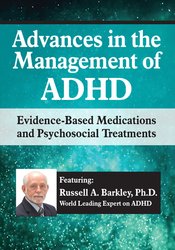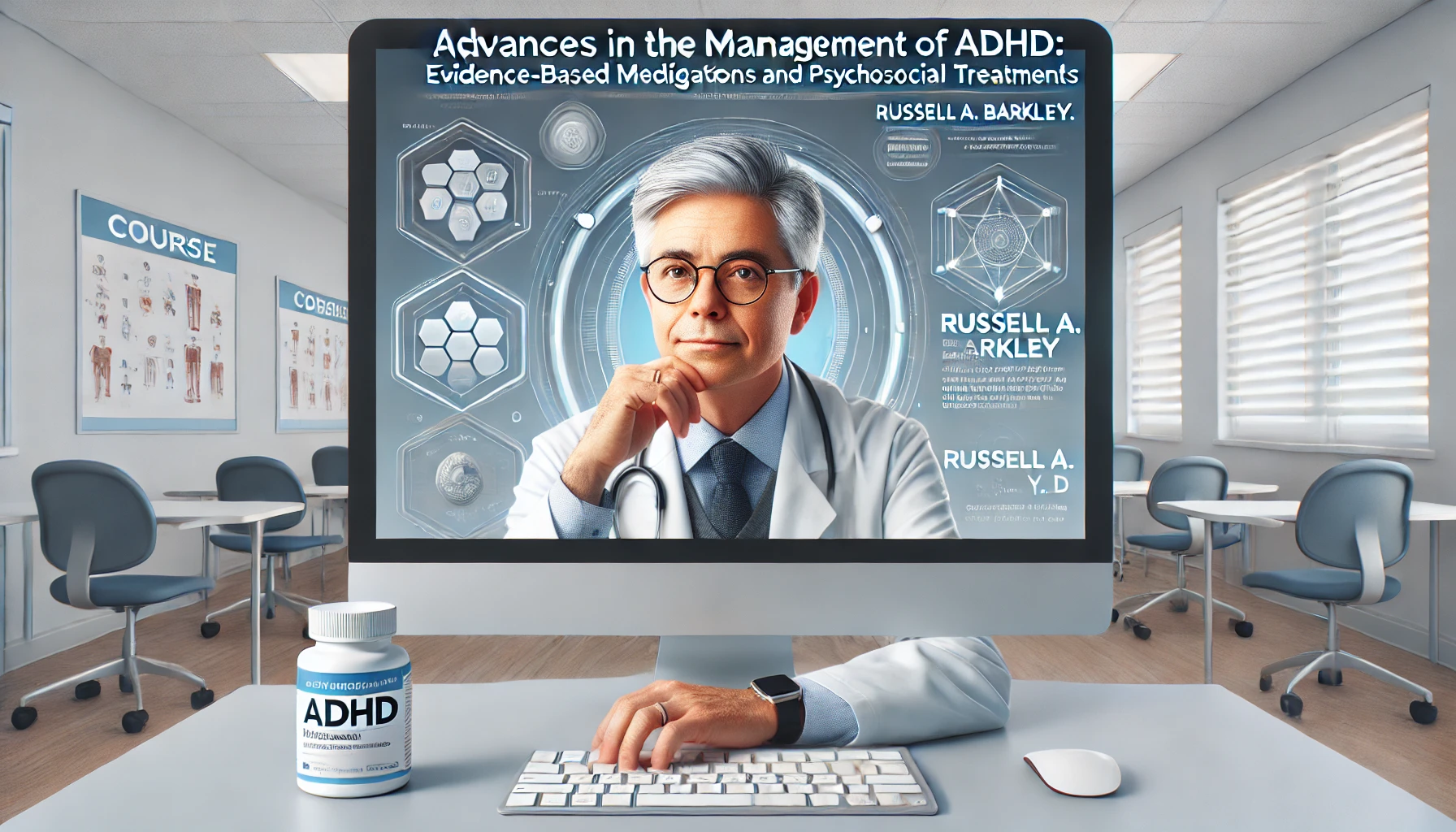Advances in the Management of ADHD-Evidence-Based Medications and Psychosocial Treatments – Russell A. Barkley
Advances in the Management of ADHD-Evidence-Based Medications and Psychosocial Treatments – Russell A. Barkley has the same quality as the author’s salapage.
Overview
Discover the Best Learning with Advances in the Management of ADHD-Evidence-Based Medications and Psychosocial Treatments – Russell A. Barkley
WisMentor is your ultimate destination for online learning. Explore "Advances in the Management of ADHD-Evidence-Based Medications and Psychosocial Treatments – Russell A. Barkley" by top authors and instructors, designed to transform your skills and career. Start now and unlock your potential!
Salepage check: Advances in the Management of ADHD-Evidence-Based Medications and Psychosocial Treatments
Author: Russell A. Barkley

- Faculty:
- Russell A. Barkley
- Duration:
- 3 Hours
- Format:
- Audio and Video
- Copyright:
- Aug 28, 2018
Description
The past 10-15 years have witnessed a number of major developments in the medications and delivery systems available for the management of ADHD. Dr. Russell Barkley discusses the types of medications now available for ADHD management and the various delivery systems developed to extend the effectiveness of the medications across the day. For each medication, he will present the major beneficial effects and side effects. He will also discuss various issues clinicians should consider in selecting medications to use with a patient with ADHD, such as those issues related to the social context, the patient’s characteristics, and any comorbid conditions that may exist.
This recording then moves on to an overview of the science-based approaches to the psychosocial management of ADHD. It also discusses those treatments that, while popular, have little evidence for their effectiveness in managing the disorder.
Handouts
| Manual – Advances in the Management of ADHD (2.25 MB) | 31 Pages | Available after Purchase |
Outline
Purpose of medication interventions
- Stimulant medications most effective and well researched ADHD interventions
- Safety, convenience and cost effectiveness are well established
Mechanisms of action for the three categories of ADHD medications Neurobiological mechanism of operation
- Traditional stimulants as compared to new alpha-2a receptor conceptualizations
Primary US approved stimulant medications
- Efficacy and factors in noncompliance
- New developments in delivery systems
- OROS, Pulse delivery, transdermal, lisdexamfetamine
Stimulant efficacy in preschoolers
- Gains smaller, side effects greater than in older children
Behavioral benefits of stimulant interventions
- Academic, temperamental
Primary side effects of stimulant interventions
- Insomnia, appetite suppression, head ache, gastric distress, cardiac effects
Common misconceptions related to stimulant use Predictors of positive response to medications Newer medication interventions
- Atomoxetine – positive and side effects, rationale for use
- Guanfacine XR – positive and side effects, rationale for use
Importance of early intervention in ADHD
- Neuroprotective effects
Off label medications used for ADHD Factors involved in choosing which medication to use
- Intervention context, patient characteristics, comorbidity
Conclusions
- Evidence based treatments
- Experimental psychosocial treatments
- Nutritional interventions
- Disproven therapies
Faculty

Russell A. Barkley, Ph.D. Related seminars and products: 14
Russell A. Barkley, Ph.D., is a Clinical Professor of Psychiatry at the Virginia Treatment Center for Children and Virginia Commonwealth University Medical Center, Richmond, VA. He is a Diplomate (board certified) in three specialties, Clinical Psychology (ABPP), Clinical Child and Adolescent Psychology, and Clinical Neuropsychology (ABCN, ABPP). Dr. Barkley is a clinical scientist, educator, and practitioner who has published 23 books, rating scales, and clinical manuals numbering 41 editions. He has also published more than 270 scientific articles and book chapters related to the nature, assessment, and treatment of ADHD and related disorders and is the author of the book Managing ADHD in School (PESI, 2016).
He is the founder and editor of the bimonthly clinical newsletter, The ADHD Report, now in its 25th year of publication. Dr. Barkley has presented more than 800 invited addresses internationally and appeared on nationally televised programs such as 60 Minutes, the Today Show, Good Morning America, CBS Sunday Morning, CNN, and many other programs on behalf of those with ADHD. He has received awards from the professional societies and ADHD organizations for his lifetime achievements, career accomplishments, contributions to research in ADHD, to clinical practice, and for the dissemination of science. His websites are russellbarkley.org and ADHDLectures.com.
Speaker Disclosures:
Financial: Dr. Russell Barkley is employed by the Medical University of South Carolina. He is on the speaker’s bureau for Eli Lilly and receives compensation. He has an advisory board relationship with Theravance and receives compensation. He is an author for Guilford Press and receives royalties. He is an author for Jones and Bartlett Publishers and receives royalties. He is a speaker for J&K Seminar and receives royalties. He is a speaker for PsychContinuingEd.com and receives royalties. He is a speaker for ContinuingEdCourse.com and receives royalties. He is a speaker who receives an honorarium for PESI, Inc.
Non-Financial: Dr. Russell Barkley has no relevant non-financial relationship to disclose.
About Advances in the Management of ADHD-Evidence-Based Medications and Psychosocial Treatments – Russell A. Barkley and Our Expert Authors
Advances in the Management of ADHD-Evidence-Based Medications and Psychosocial Treatments – Russell A. Barkley is part of our extensive collection of over 70,000 premium courses at WisMentor. Created by renowned authors and industry leaders, this course is tailored to provide cutting-edge knowledge and actionable insights.
Why Choose WisMentor?
- 🌟 Access courses from world-renowned authors.
- 📚 Wide range of topics to suit your professional and personal growth needs.
- 💼 Lifetime access and flexible learning options.
Key Features of Advances in the Management of ADHD-Evidence-Based Medications and Psychosocial Treatments – Russell A. Barkley:
- ✅ Comprehensive content covering essential topics.
- ✅ Evidence-based methodologies and practical examples.
- ✅ Learn at your own pace with expert guidance.
How to Access Your Course?
Getting started is easy:
- 📩 Receive an instant download link via email.
- 🌐 Access your course anytime through your account dashboard.
- 📱 Compatible with all devices for a seamless experience.
Need Help?
Our dedicated support team is here to assist you. Visit our Contact Us page or reach out via email for any queries or assistance.
More from Our Collection:
Don’t miss the opportunity to explore more courses from top authors and enrich your learning journey at WisMentor. Find your next course now and take your skills to the next level.
Curriculum
Curriculum
- 1 Section
- 0 Lessons
- 3 Weeks
- Manual – Advances in the Management of ADHD (2.25 MB)0
FAQs
Requirements
- Professional Background: A foundational understanding of ADHD, its symptoms, and general treatment approaches is recommended to fully benefit from this course.
- Technical Needs: Reliable internet access and a device capable of streaming video content are necessary to access the course materials.
Features
- Comprehensive Coverage: In-depth exploration of both pharmacological and psychosocial treatments for ADHD.
- Expert Instruction: Led by Dr. Russell A. Barkley, a renowned authority in ADHD research and treatment.
- Evidence-Based Content: Focus on treatments and interventions supported by current scientific research.
- Practical Applications: Strategies and insights applicable to clinical practice and educational settings.
Target audiences
- Healthcare Professionals: Psychiatrists, psychologists, pediatricians, and general practitioners seeking to enhance their knowledge of ADHD management.
- Mental Health Practitioners: Counselors, therapists, and social workers involved in the treatment of individuals with ADHD.
- Educators and School Administrators: Individuals aiming to understand ADHD interventions to support students effectively.
- Researchers and Students: Those studying ADHD or related fields who wish to gain insights from a leading expert.


